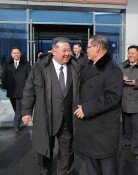Lessons From 1910
In the final royal court meeting of the Joseon Dynasty on Aug. 22, 1910, Prime Minister Lee Wan-yong asked Emperor Sunjong to grant him full authority to sign a bilateral annexation treaty with Japan. After getting approval, Lee visited the official residence of Terauchi Masatake, the Japanese resident-general of Korea, and stamped the document. The treaty was officially announced a week later, ending 500 years of Joseon rule and making Korea a colony for the first time in its history. Sunday marks the centennial anniversary of a national disgrace that left an unforgettable and humiliating scar on the Korean people.
The country should mark the anniversary with self-reflection and soul searching on why it lost its sovereignty in 1910. Though imperialists drooled over the Korean Peninsula, Koreans cannot shun responsibility for failing to defend their country. Had the Joseon Dynasty grasped global trends, achieved modernization on its own, and built up its defense and economic power, it could have avoided disgracing the country. With repeated internal division, confusion in setting the direction of the nation, and failure to assess the international political situation, Korea fell prey to imperial powers.
It is evident, however, that the annexation treaty was invalid. After usurping Koreas diplomatic sovereignty by forcing Korea to sign the Eulsa Treaty in 1905, Japan deployed more than 20,000 troops on Korean soil to threaten the Joseon Dynasty and its people before annexing Korea in 1910. Even Terauchi, who signed the annexation treaty, admitted that it was signed in an illegal and forceful manner. He said the might of the Japanese military and police and incessant guard duty indirectly played an enormous role. In May this year, Korean and Japanese scholars adopted a joint declaration saying they had evidence that the annexation came from suppressing the Korean peoples resistance.
Japan, however, maintains that the annexation treaty was valid when signed but became invalidated with the establishment of the Republic of Korea in 1948. Tokyo should quickly recognize that the treaty was never valid. It must also resolve other pending issues such as sex slaves, forced laborers and history distortion, including its claim over the Dokdo islets in the East Sea, to allow a forward-looking relationship between the two neighbors to solidly take root.
After the grueling experience of being under colonial rule, the people have achieved the miraculous prosperity of the Republic of Korea. Rather than being complacent with the achievement, however, a comparison of the situation between 100 years ago and today is needed. The intensifying ideological confrontation centered on North Korea resembles the internal rift of the Joseon Dynasty over opening up to the West.
Another question is if South Korea is preparing well for the national challenge of building wealth and power. The country has had the worlds 15th-largest economy since 2008, down from 11th in 2003. In addition, socio-economic bipolarization is worsening, undermining the middle class. A clash of global powers over the Korean Peninsula is also repeating itself. A wise and swift judgment of the international situation is required more now than 100 years ago.
To avoid repeating the national disgrace committed a century ago, the people should re-examine what lessons they have learned and renew their determination based on cool-headed recognition of reality.







